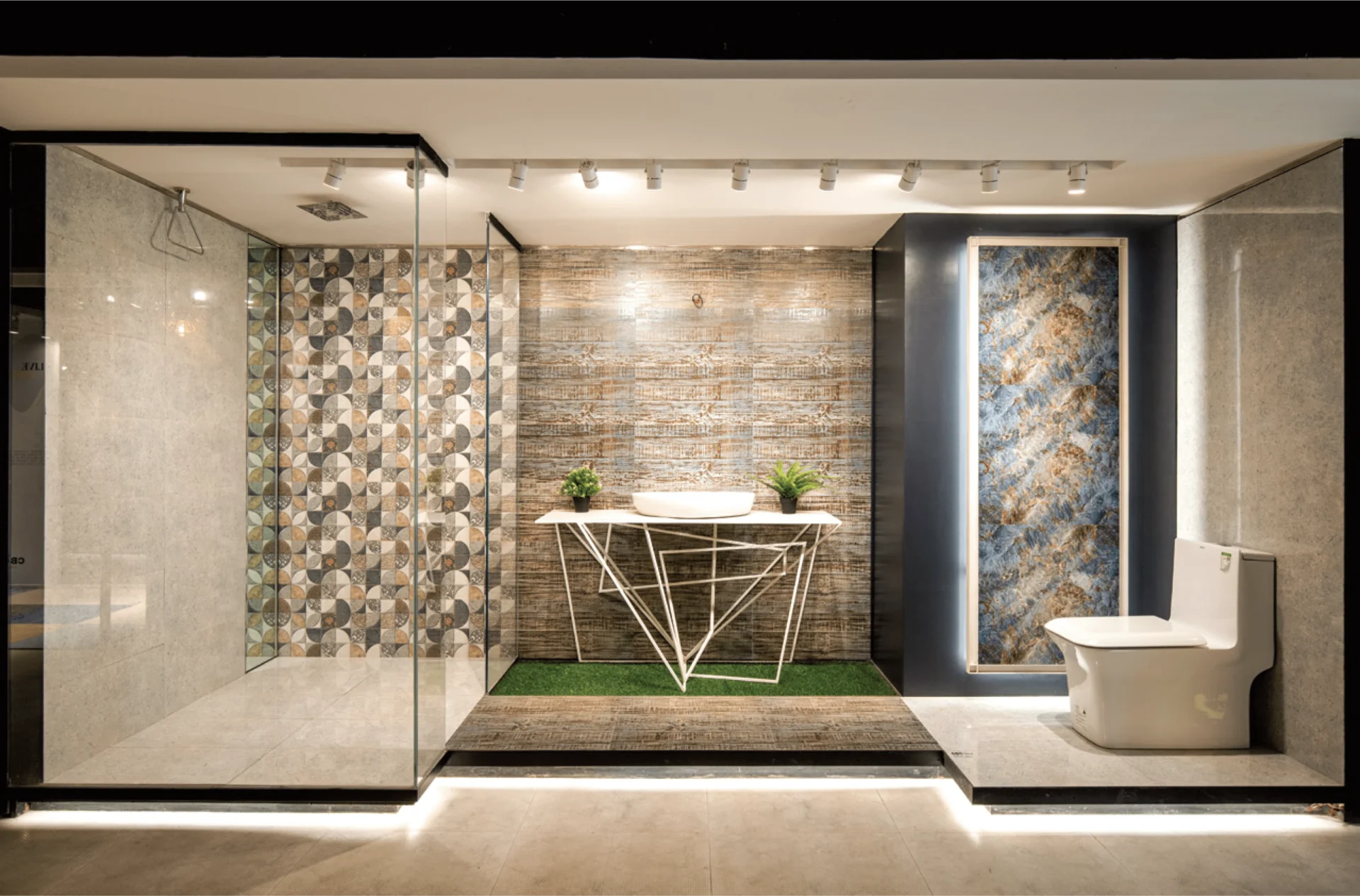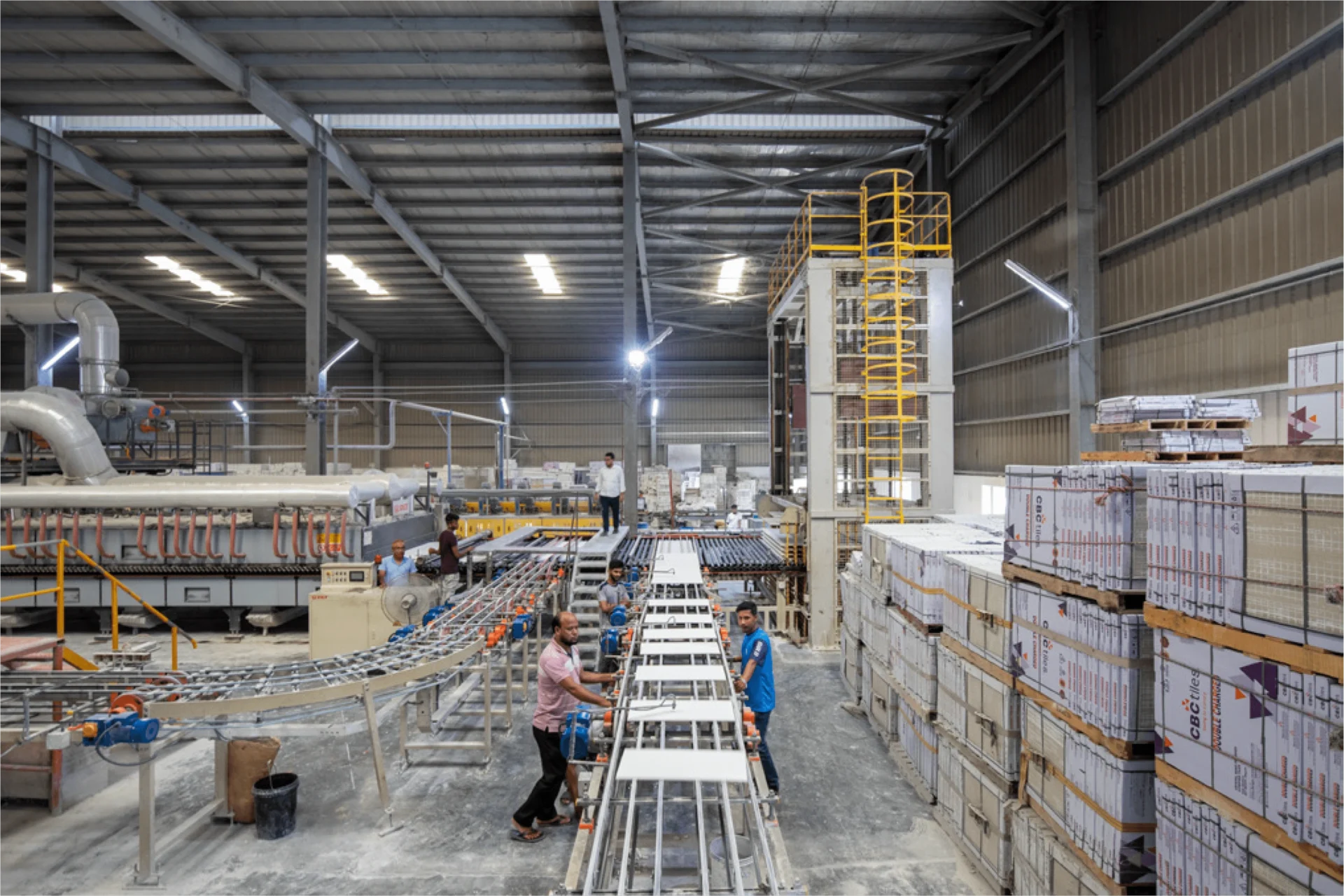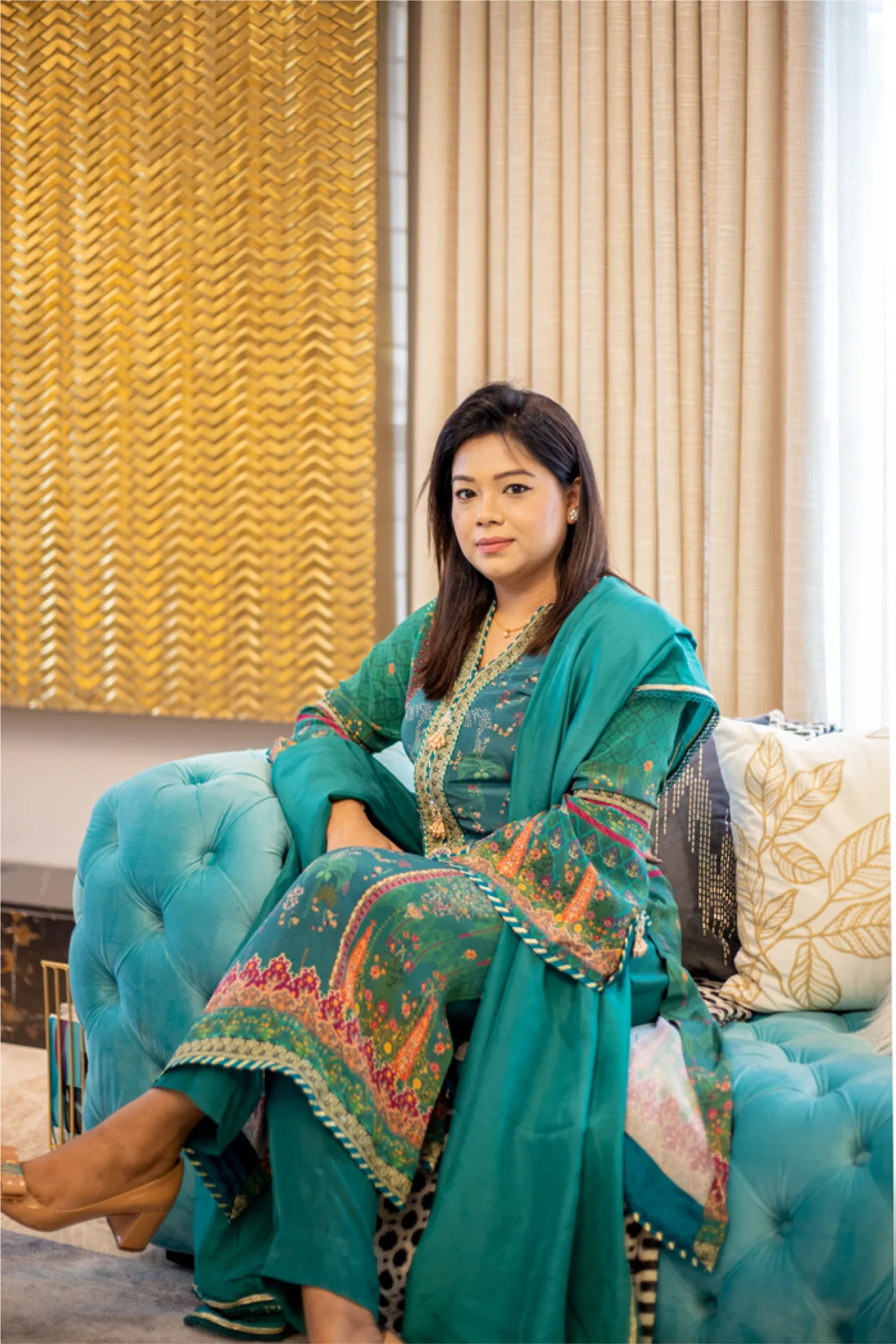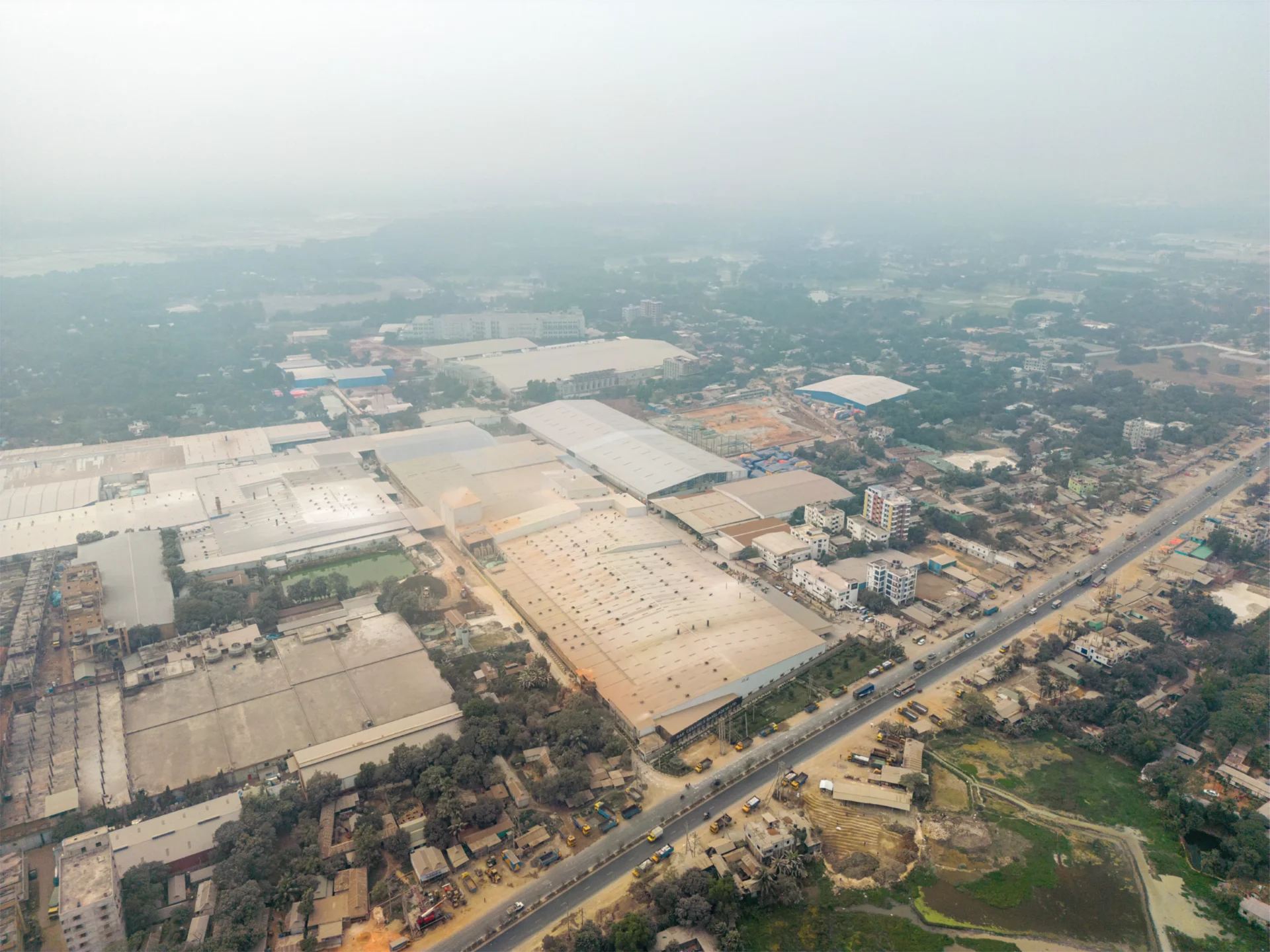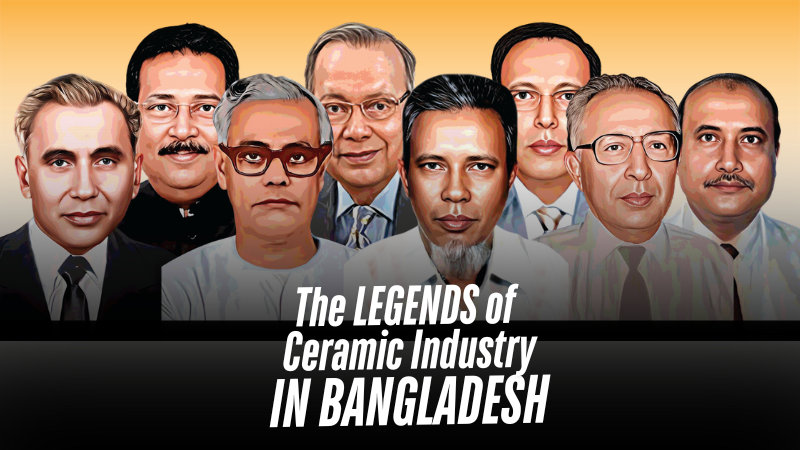
The LEGENDS OF CERAMIC INDUSTRY IN BANGLADESH
The ceramic industry in Bangladesh boasts a rich heritage and has produced several legends known for their significant contributions to ceramics and overall company formation. The industry has grown substantially over the past few decades, establishing itself as a leading sector in the country’s economy. In 1992, with the rapidly growing ceramic industry, a nationally recognized trade organization of manufacturers and exporters of ceramic tableware, pottery, tiles, sanitary ware, insulators, and other ceramic products was formed, called the Bangladesh Ceramic Manufacturers & Exporters Association (BCMEA), under the leadership of many of these ceramic legends. Here, we highlight some legendary leaders and key entrepreneurs who have been instrumental in the journey of the ceramic industry in Bangladesh. These pioneers have laid the foundation for the thriving ceramic industry in Bangladesh, which now covers various subsectors such as tableware, tiles, sanitary ware, and ceramic bricks. Their legacies continue to inspire future generations of ceramic entrepreneurs and professionals. Mohammad Abdul Jabbar Known as the pioneer of the ceramic industry in Bangladesh, Mohammad Abdul Jabbar founded Tajma Ceramic Industries. His contributions laid the foundation for modern ceramic manufacturing in the country. The story of Tajma Ceramic Industries Ltd is quite fascinating. In 1958, the ceramic industry took its nascent steps with only one small tableware manufacturing plant in Bogura. Mohammad Abdul Jabbar, instrumental in promoting and advancing the ceramic factory in Bangladesh, was the Managing Director of the company until his death on May 7, 1985. Tajma Ceramic Industries, recognized as the oldest modern ceramic manufacturing plant in Bangladesh, marked the formal beginning of the ceramic industry in the country. It was the first ceramic earthenware plant to produce porcelain tableware using traditional methods. Tajma played a crucial role in pioneering porcelain tableware production using advanced technology for its time, inspiring many other manufacturers to follow suit. Ariff Wali Mohammed Tabani In 1958, Mirpur Ceramic Works Ltd in Dhaka began producing heavy clay products using German plant and technology, gaining a reputation for manufacturing the best quality ceramic bricks in the subcontinent. The late Ariff Wali Mohammed Tabani, known for his contributions to Mirpur Ceramic Works, played a key role in its evolution. Tabani was the founding Chairman and Managing Director until his death on December 7, 1990. Currently, the company manufactures various types of unglazed tiles and has established two more ceramic companies, Khadim Ceramics and Sunshine Bricks. Both Mirpur Ceramic Works Ltd. and Khadim Ceramics Ltd. have been synonymous with ceramic-based construction materials, manufacturing a comprehensive range of products including blocks, bricks, ornamental screens, claddings, pavers, roofing tiles, and floor and wall tiles, along with the necessary mortars. These materials have been pivotal in landmark projects nationwide, showcasing the group’s commitment to quality and innovation. Md. Abdul Hai Mohammad Abdul Hai was a visionary entrepreneur who founded the country’s first ceramic sanitaryware company, Dacca Ceramics and Sanitary Wares Ltd., in 1969. He embarked on a revolutionary journey in the ceramic sector with the aim of advancing the country through innovative ceramic products. Despite facing political unrest and significant challenges during the Bangladesh Liberation War in 1971, which led to the destruction of the factory and the loss of materials, Abdul Hai was determined to rebuild the company. After the war, he successfully revived the company in 1974. Dacca Ceramics became the country’s first non-heavy clay building ceramic plant and started the production of sanitaryware in Tongi, Gazipur. Under his leadership, the company grew to become a leader in the country’s ceramics industry, known for its high-quality, durable, and cost-effective products. Abdul Hai’s dedication and resilience played a crucial role in shaping the success of Dacca Ceramics, leaving a lasting legacy in the industry. Mr. Hai passed away on December 21, 1995. Ansar Uddin Ahmed A key figure in Peoples Ceramic Industries, Ansar Uddin Ahmed significantly contributed to the industry through innovation and quality control, helping the company gain a strong foothold in domestic market. In 1966, Peoples Ceramic Industries Ltd, formerly known as Pakistan Ceramic Industries and located in Tongi, Gazipur, began production using modern porcelain tableware manufacturing technology from Japan and started exporting their products. The late Ansar Uddin Ahmed, a respected entrepreneur, inspired many in the field. He was the Managing Director of Peoples Ceramic Industries and Standard Ceramic Industries Ltd and passed away on August 14, 2005. He served as the first President of BCMEA from 1992 to 2002, revolutionizing the export of local ceramic products Rashed Mowdud Khan As the Managing Director of Bengal Fine Ceramics Ltd, Rashed Mowdud Khan advocated for sustainable practices and modern technologies in ceramic production, enhancing the global reputation of Bangladeshi ceramics. In 1986, Bengal Fine Ceramics Ltd, the first stoneware tableware manufacturer in Bangladesh, entered both domestic and international markets. The late Rashed Mowdud Khan was a prominent figure in ceramics, known for his artistic and technical expertise. He served as the first General Secretary of BCMEA from 1992 to 2002 and President four times from 2003 to 2009. He passed away on January 9, 2011. Iftakher Uddin Farhad Mr. Iftakher Uddin Farhad was the Chairman & Managing Director of FARR Ceramics Ltd and served as the President of BCMEA in the 2011-13 session. Established in 2005, FARR Ceramics is a manufacturer and exporter of Euro Fine Porcelain tableware. The company began as an export-oriented business in 2007, producing hard porcelain tableware for both international and local markets. Located in Gazipur, Bangladesh, the plant is equipped with state-of-the-art European ceramics manufacturing technology from Germany and Italy, and decal printing technology from Japan. FARR Ceramics currently exports to 31 countries, from North America to Europe, the Middle East, and India, with a monthly production capacity of 2 million pieces. Mr. Farhad passed away on December 25, 2012. Golam Sabur Tulu The founder of Madhumati Tiles Ltd, Golam Sabur Tulu introduced advanced technologies and designs in ceramic manufacturing, significantly impacting the market in Bangladesh. He was a visionary entrepreneur who made significant contributions to the ceramic industry.
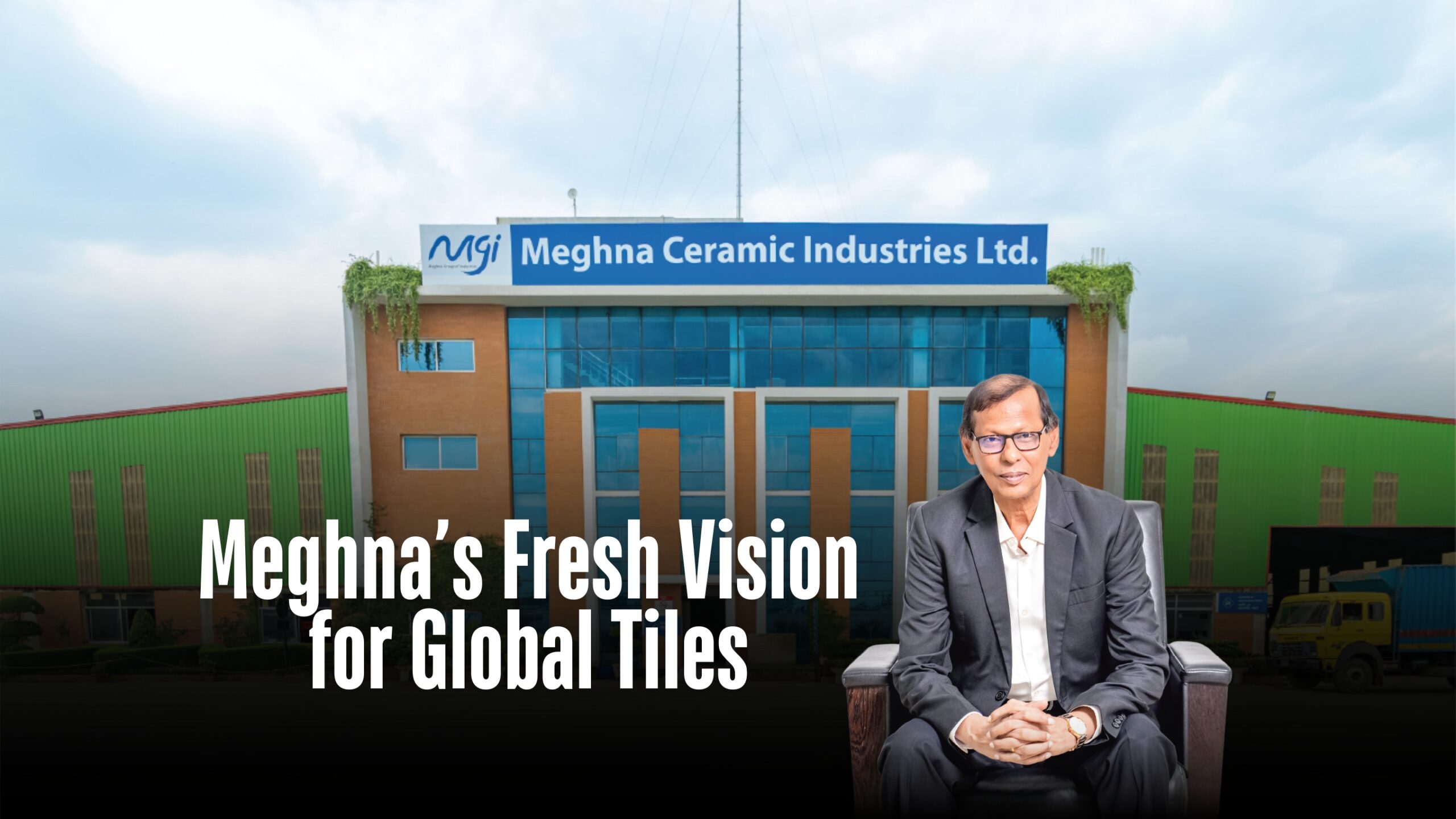
Meghna Ceramic’s Fresh brand redefining Bangladesh’s ceramic industry
Sustainability, innovation, and design leadership define Meghna Ceramic Industries Ltd. (MCIL), a concern of Meghna Group of Industries (MGI). Since its establishment in 2021 under the brand Fresh Ceramics, the company has rapidly grown into one of Bangladesh’s leading tile manufacturers while setting new benchmarks in responsible ceramic production. Nestled in Ashariar Char of Meghnaghat, Sonargaon, Narayanganj — nearly 39 kilometres from the capital Dhaka — MCIL boasts the highest tile production capacity in Bangladesh at 51,000 square metres per day. With cutting-edge machinery from the USA, Germany, Italy, and China, and Bangladesh’s longest kiln (261 metres) under a single shade, MCIL reflects both scale and vision. But what truly distinguishes it is a deep commitment to sustainability and environmental stewardship, ensuring growth aligns with ecological responsibility and worker wellbeing. Sustainability at the Core AKM Ziaul Islam, chief operating officer at Meghna Ceramic, explained how Fresh Ceramics is working to remain true to its promise of “A Fresh Start to an Aesthetic Life.” “We have designed our factory to minimise environmental impact while maximising efficiency.” MCIL has taken six core initiatives: Zero Groundwater Dependency: Surface water treated in-house through a Water Treatment Plant (WTP). Wastewater is purified in an Effluent Treatment Plant (ETP) and safely discharged — ensuring a closed-loop water cycle. Emission-Free Operations: Kilns release only clean white vapour, with no carbon emissions or black smoke. Advanced Heat Management: Controlled heat systems eliminate external heat emissions, ensuring worker-friendly indoor conditions. Dust-Free Environment: A dust management system ensures minimal discharge, protecting workers and the community. Renewable Energy Integration: Solar panels feed into the company’s grid, reducing fossil fuel dependence. Daylight Optimisation: Architectural features reduce the need for artificial lighting, lowering electricity use. Together, these initiatives underscore MCIL’s leadership in sustainable manufacturing and its role as a responsible industry pioneer. “We designed the factory not only to protect the environment but also to ensure a safe, healthy, and efficient workplace for our employees,” Islam added. Vision and Growth “The vision behind MCIL was to redefine aesthetic living in Bangladesh by offering high-quality ceramic tile solutions that combine durability, functionality, and design,” Islam said. Fresh Ceramics started with small-sized tiles before expanding across all ranges and surfaces. Known for glossy tiles with exceptional smoothness, it became the first in Bangladesh to introduce a full line of double charge tiles in three market-winning sizes. Building on that success, MCIL now offers matt and matt-carving tiles, with its R&D team pushing innovation to match modern lifestyles. Nationwide, the brand has built a robust distribution network through dealers, retailers, and exclusive showrooms. Its flagship display centre, “House of Aesthetics,” opened in Dhaka’s Hatirpool, with another underway in Chattogram. Innovation and Technology Meghna Ceramic has invested heavily in advanced laboratories and modern systems, ensuring precision, durability, and design superiority. Its laboratory is currently the most advanced in Bangladesh, capable of analysing raw materials and finished products with extreme precision. Social Responsibility “Our parent company, Meghna Group of Industries, is actively engaged in a wide range of CSR initiatives, contributing significantly to community development across Bangladesh,” said the COO. “Uniquely, we have introduced an insurance policy — the first of its kind in Bangladesh’s tile industry — for over 3,000 tile fitters, recognising their essential role in the sector.” Along with this, every year the “Eid Express” campaign is organised, through which the group ensures safe travel for lower-income tile labourers, workers, fitters, and store assistants at dealer showrooms. MCIL also takes pride in other efforts that the group undertakes to contribute to society. “We have currently employed over 1,500 people across our factory, sales, distribution, and support departments. Women are working side by side with men, ensuring an inclusive and diverse workplace,” Islam added. Meghna Ceramic also maintains a clean, safe, and climate-controlled work environment, where skilled and semi-/non-skilled individuals are hired and provided with on-the-job training to help them gain industry-relevant skills. Challenges and Resilience The ceramic industry faces hurdles such as raw material dependency, volatile energy prices, and high taxation. “Over 90 percent of essential raw materials are imported, making manufacturers vulnerable to global fluctuations,” said Islam. MCIL tackles these challenges by running efficient production lines, sourcing through diversified suppliers, adopting renewable energy, and advocating for supportive policies. Market Leadership and Future Outlook Domestically, Fresh Ceramics has become the highest-selling tiles brand in Bangladesh. MCIL is confident of entering global markets soon, backed by international-standard production and competitive pricing. Meghna Ceramic is preparing to expand into sanitaryware alongside new surface technologies and tile sizes. Its strategy balances nationwide reach with a growing focus on metropolitan and cluster markets. “We actively gather market insights and conduct R&D to drive innovation. Our future expansion is designed to make Fresh Ceramics a complete lifestyle solution for customers,” Islam said. Ready for the Global Market MCIL is not just building for the local market — it’s thinking globally. Its advanced production lines, strict quality control, and trend-driven designs make it a strong candidate for international success. “From the ground up, we built MCIL with a global mindset. Our plant layout, automation level, lab testing capabilities, and product design are all geared toward international markets. We’ve already received interest from buyers in the Middle East and Europe,” said Ziaul. He emphasised the brand’s international readiness and commitment to excellence. “Fresh Ceramics is not just a local brand — it’s designed for global demand. Whether it’s product innovation or packaging, we’ve benchmarked ourselves against top-tier global producers. Our leadership believes that only those companies that combine innovation with responsibility will survive in the global arena.” Leading with Purpose With sustainability at its core, innovation driving its growth, and responsibility guiding its social impact, Meghna Ceramic Industries Ltd. is not just producing tiles — it is shaping the
